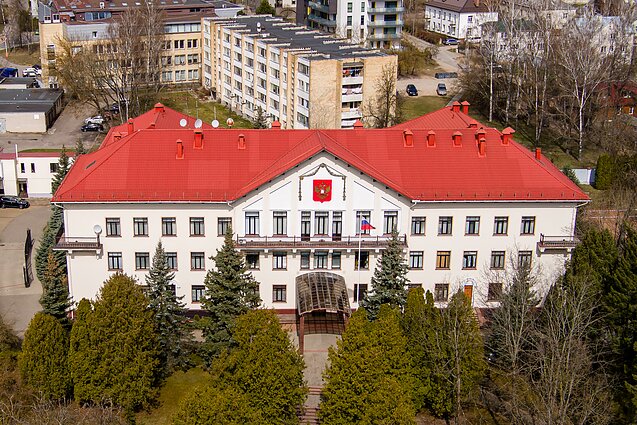
After Russia’s full-scale invasion of Ukraine, a number of Russian spies operating under diplomatic cover have been expelled from Lithuania. The LRT (Lithuanian Radio and Television) investigation team, together with international partners, analyzed the Russian intelligence network in Europe, revealing the identities and activities of spies who operated in Lithuania for several years. Here is a summary of the team’s findings.
Until recently, the Russian Embassy in Vilnius has been known as a training ground for Russian intelligence officers. However, in April 2022, in response to Russia’s massacre in Ukraine’s Bucha, Lithuania sent away Russian ambassador Alexei Isakov and closed the Russian consulate in Klaipėda, which employed 14 people. Since the beginning of Russia’s war in Ukraine, five Russian diplomats, whose activities were incompatible with the status of a diplomat, have also been expelled from Lithuania.
Since February 24, 2022, more than 400 Russian spies under diplomatic cover have been expelled from the EU countries. Most of them work for Russia’s three main intelligence agencies: the Foreign Intelligence Service (SVR), the Federal Security Service (FSB), and the Main Directorate of the General Staff of the Armed Forces (GRU).
Due to the specific nature and risks of counter-intelligence activities, Lithuania’s State Security Department (VSD) does not disclose the names of the Russian spies expelled from the country, only noting that: “The expelled Russian intelligence officers were conducting covert intelligence in Lithuania. Using the cover of diplomats, they recruited Lithuanians who could provide political, economic, and military information, sought to influence Lithuania’s political decisions in a direction favourable to Russia, or provided support for operations carried out by other intelligence officers,” stated the VSD.
The LRT Investigation Team, in cooperation with colleagues from European media outlets and the Dossier Centre for Investigative Journalism, identified the Russian Embassy employees involved in intelligence activities in Lithuania. Testimonies of politicians and former diplomats also revealed how Russian spies gather information and recruit key figures.
In general, Russian intelligence uses a variety of methods to get close to a person of interest.
“In Geneva, I was constantly receiving attention, invitations to visit, other communication initiatives from Konstantin Shakhmuratov, a long-time employee of the Russian foreign affairs system. Later, when I went to work in Brussels, he found me there again, as if accidentally,” said Romas Švedas, a former diplomat who left the public sector to teach at Vilnius University’s Institute of International Relations and Political Science (TSPMI).
MP Dovilė Šakalienė, a member of the Committee on National Security and Defence, also spoke about her encounters with Russian intelligence officers posing as diplomats. When she was working at the Centre for Human Rights, the Russian Embassy staff offered to support some of the centre’s activities. “The Russian Embassy at that time was targeting NGOs, especially in the field of human rights. When they offered to support our centre’s projects, they also asked for information – they were interested in the lists of Belarusian students studying at the European Humanities University (EHU) in Vilnius and asked if we were in contact with Belarusian NGOs,” Šakalienė said.
According to the VSD, between 2018 and 2023, eleven Russian diplomats were expelled from Lithuania for activities incompatible with their status as diplomats. In the years leading up to 2018, there were only five such cases. Former high-ranking politicians noted that the number of spies expelled did not reflect the actual Russian intelligence capabilities in Lithuania. The decisions to expel identified Russian spies were complicated by the fact that Moscow always retaliated by reducing Lithuania’s diplomatic representation.
According to LRT’s sources, Russian intelligence services usually have their officers in embassies to monitor the activities of the spies and their family members. Their job is to make sure that the spies have not become close to the intelligence services of hostile countries or inadvertently given away their activities. If there is a threat that intelligence officers may be identified, they are immediately sent away.
Russian intelligence officers working under diplomatic cover gather information by attending embassy and other receptions, public events, and meetings. They observe selected individuals, taking an interest in their hobbies, family, and weaknesses, and draw up their comprehensive psychological profiles.
According to LRT’s sources, each Lithuanian diplomat has their own binder containing a detailed dossier. This dossier follows the diplomat’s appointments and is kept at the respective Russian embassy. Once the conditions for contact are created, the aim is to recruit the person, to get them to work for a foreign country, either for money, through blackmail, or out of ideology.
The sources stressed that although Lithuania is a small country, experienced intelligence officers are assigned to spy in the country and on Lithuanians abroad. But according to counter-intelligence experts, it is difficult for spies under diplomatic cover to operate in Lithuania, where there is little chance of going undetected. The VSD is also almost always aware of whether a diplomat sent to Lithuania has intelligence assignments.
KGB files that were not destroyed were taken to Russia in 1989-1990 and are used for blackmail. According to historians, the Lithuanian Special Archive has only 68 work or personal files, as well as several dozen files containing codified agent reports and files on agent “candidates”.
Asked to assess Russia’s intelligence capabilities, the VSD said that the biggest counter-intelligence threat to Lithuania comes not from Russian spies working under diplomatic cover but from “intelligence from the territory” by Russia and Belarus. This is when Russian and Belarusian intelligence services recruit Lithuanian citizens travelling to their territory send Russian and Belarusian citizens cooperating with the intelligence services to Lithuania to carry out intelligence tasks, and, in some cases, temporarily deploy intelligence officers with various non-diplomatic covers to Lithuanian territory to carry out intelligence tasks, according to the VSD.
After losing diplomatic cover, Russian intelligence is looking for new avenues, concludes the LRT report. Across Europe, the opposition that has defected from Russia is being targeted by intelligence services, and every effort is being made to expose the weaknesses in Western intelligence.



























